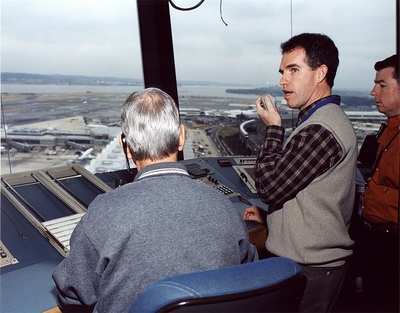Says Staffing Levels Have Dropped For Third Consecutive
Year
 Citing the FAA
Administrator's Fact Book in a press release today, the National
Air Traffic Controllers Association (NATCA) says controller
staffing levels have dropped for the third straight year, to a new
low of 14,206.
Citing the FAA
Administrator's Fact Book in a press release today, the National
Air Traffic Controllers Association (NATCA) says controller
staffing levels have dropped for the third straight year, to a new
low of 14,206.
This, says NATCA, is despite the FAA's public claims it hired
more controllers than it lost to retirement and other factors over
the past year. NATCA says the number of controllers working at the
FAA's 300-plus facilities dropped from 14,227 at the end of fiscal
year 2005 to 14,206 in fiscal year 2006. The figures are listed as
current as of October 31, 2006, which would include hiring and
attrition statistics a full month into the current fiscal year.
NATCA says controller staffing reached 15,386 as recently as
September 2003, but a year later, in October 2004, the FAA reported
the number had fallen to 14,736. The controller's union attributes
this to a growing "retirement wave" it's warned of for the past few
years.
"This is the most definitive proof yet, from the FAA's own
reported figures, that the agency simply cannot get ahead of the
retirement wave, no matter how many people they say they are hiring
and trying to rush into the system," NATCA President Patrick Forrey
said. "The agency is now rapidly losing its most veteran,
experienced controllers - the people who it was counting on to
train its new generation of controllers - at a far higher rate than
it expected and is continuing to force more veterans to retire
early with its demoralizing, distracting and authoritarian imposed
work rules."
NATCA says veteran controllers are currently retiring at a rate
of more than three per day since October 1st. It says controller
retirements last year exceeded FAA projections by 57 percent. The
association warns if the pace continues, FY07 retirements will
exceed this year's FAA projection of 643 by Memorial Day -- four
months before the end of the fiscal year. NATCA says the FAA has
missed its retirement projections for three straight fiscal years,
by an increasing margin each year.
Controllers can retire before the mandatory age of 56 if they
have met one of two criteria: Reach age 50 and have 20 years of
service; or have 25 years of service at any age.

"Rather than 'staffing to traffic' as the FAA states publicly is
its new mission, the agency appears to be following a new policy;
'staffing to budget,'" Forrey said. "And the scary part is no
amount of new hires the agency has made over the past two years or
will make over the next 2-4 years is going to fix the current
staffing problem. That's because it takes 2-4 years to train a new
controller before that professional is fully certified.
"That gap, from the day a veteran controller retires to the day
their replacement reaches full certification level, is where we
have the most reason to worry about the agency's continued ability
to maintain the margin of safety in the system by ensuring there is
redundancy. Our greatest challenge today, besides the distraction
of the imposed work rules, is maintaining the margin of safety
knowing the level of redundancy has been whittled away to its bare
minimum. We need more eyes watching the skies."
 NTSB Final Report: Cessna 177B
NTSB Final Report: Cessna 177B ANN's Daily Aero-Term (05.08.25): Final Approach Fix
ANN's Daily Aero-Term (05.08.25): Final Approach Fix Aero-News: Quote of the Day (05.08.25)
Aero-News: Quote of the Day (05.08.25) ANN's Daily Aero-Term (05.09.25): Estimated (EST)
ANN's Daily Aero-Term (05.09.25): Estimated (EST) ANN's Daily Aero-Linx (05.09.25)
ANN's Daily Aero-Linx (05.09.25)




